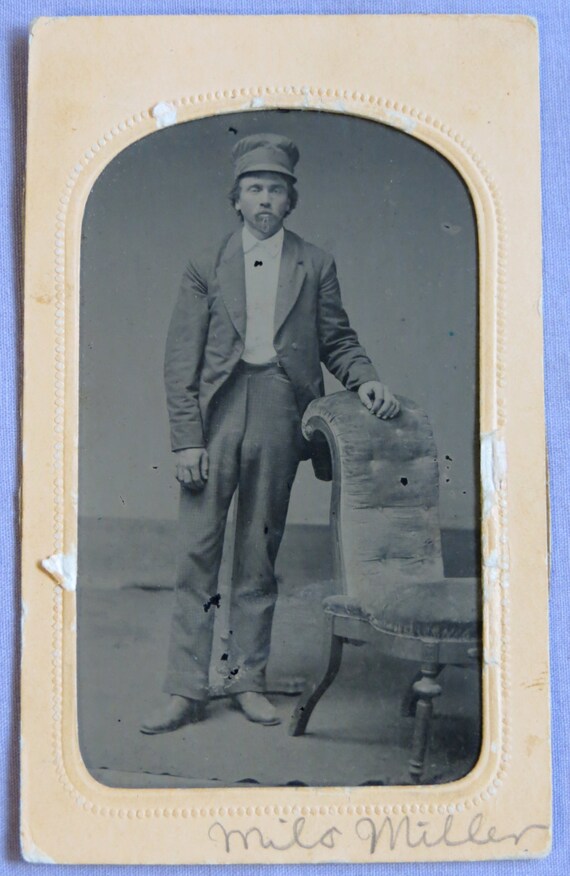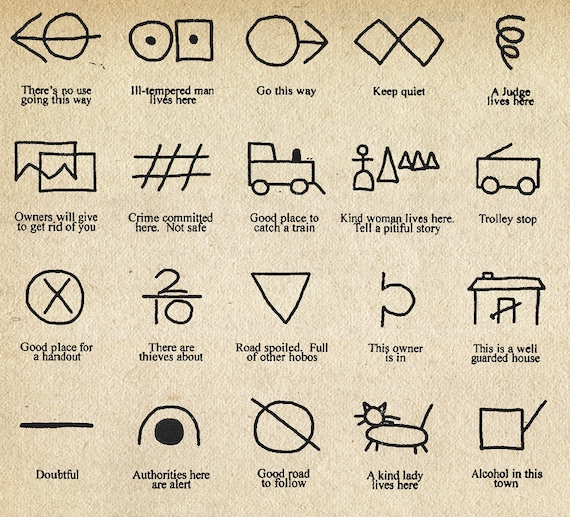Monday is opening day of the annual, week-long National Hobo Convention in Britt, Iowa (August 3-9, 2015). To celebrate the life of these wandering workers here are a few insights and ephemeral facts and documents related to hobos.
From
Wikipedia:
"A hobo is a migratory worker or homeless vagabond—especially one who is penniless. The term originated in the Western—probably Northwestern—United States around 1890. Unlike "tramps", who work only when they are forced to, and "bums", who do not work at all, "hobos" are traveling workers."
The origin of the term hobo is unknown. According to etymologist Anatoly Liberman, the only certain detail about its origin is the word was first noticed in American English circa 1890.[1] Liberman points out that many folk etymologies fail to answer the question: "Why did the word become widely known in California (just there) by the early Nineties (just then)?"[1] Author Todd DePastino has suggested it may be derived from the term hoe-boy meaning "farmhand", or a greeting such as Ho, boy![3] Bill Bryson suggests in Made in America (1998) that it could either come from the railroad greeting, "Ho, beau!" or a syllabic abbreviation of "homeward bound".[4] It could also come from the words "homeless boy"
1. "On Hobos, Hautboys, and Other Beaus". OUPblog. Oxford University Press. November 12,
2008. Retrieved 2009-08-05.
2. Mencken, H.L. (1937). "On the road again". The American Language (4th ed.).
grammarphobia.com (July 25, 2009). Archived from the original on 2012-05-05. Retrieved
2013-05-06.
3. Interview with Todd DePastino, author of Citizen Hobo: How a Century of Homelessness
Shaped America from the University of Chicago Press website
4. Bryson, Bill (1998). Made in America.[page needed]. ISBN 978-0-380-71381-3.
Various periods of American history have stimulated the growth of the Hobo popultation. From the end of the Civil War which saw many displaced veterans hopping the rails in search of work to the surge in the 1890s during the depression of the time. And of course the Great Depression in the 1930's put not only single people but whole families on the road and rails in search of work.
1900 -
Britt, Iowa and the Hobos
This friendship began with the aspirations of three Britt men, Thomas A. Way, T.A. Potter, and W.E. Bradford, in 1900. Their desire was to gain some attention for the small Iowa town to "do something different to show the world that Britt was a lively little town capable of doing anything that larger cities could do."
Way and Potter read a report in the Chicago paper that Tourists Union No. 63 had elected as officers Onion Cotton, of Danville, Illinois and Grand Head Pipe Charles F. Noe, of Sycamore, Illinois. They wrote to Noe and invited him to bring the Hobo Convention to Britt in 1900. Noe wrote them that he would come out to Britt and look the ground over, providing Way and Potter would defray his carfare and expenses. They agreed.
It was an autumn day in 1899 that Noe arrived at the Milwaukee depot and was met by Way and Potter. They wined and dined the Grand Head Pipe, then called in an attorney, W.E. Bradford, to guide the proceedings and see that they were legal. They also invited Phil Reed, a newspaper man connected with the Britt News. The four men must have guaranteed that the Hobo Convention would go over big in Britt, for Noe agreed to bring the convention to Britt in 1900 and the 22nd day of August was set as the date.
Bailey of Britt, a nationally known humorist and an ardent conventioneer, assumed the publicity end of the promotion, and various other men took responsible positions on the committees. The novelty of the convention appealed to newspaper reporters everywhere, and everyone talked it up, taking the matter as a joke - except the promoters.

From Britt, Iowa homepage:
"The Britt hobo logo was first used in the 1900 convention announcements and advertising. The figure used in the ad has been changed very little over the years and is now found around town on school letterheads, the city's watertower, on the highway welcome sign, as well as on restaurant menus.
The "Britt hobo" is thought to be Tourist Union 63 President Onion Cotton. Onion Cotton is the hobo who agreed to bring the convention to Britt in 1900."[/caption]
Here are a few more links for more info on the National Hobo Convention and Hobo History
National Hobo Convention, Britt, Iowa (Aug. 3-9)
hobo.com
Hobo Museum, Britt, Iowa
Another interesting hobo storyline is the work of James Eads How (1874 - 1930) was an American organizer of the hobo community in the early 20th century. Heir of a wealthy St. Louis family, How chose to live as a hobo and to help the homeless migrant workers. The newspapers often referred to him as the "Millionaire Hobo".
How was the founder, driving force, and financier of the International Brotherhood Welfare Association, a union for migrant workers which published Hobo News, and organized hobo colleges and hobo conventions.
More about James Eads How on Wikipedia
Here are some links to hobo ephemera available for purchase today:
(HOBOES OF AMERICA.) DAVIS, JEFF KING-EMPEROR.A GATHERING OF ORIGINAL HOBO EPHEMERA.

Cincinnati. c.1947. The collection is comprised of : two handwritten correspondences on official "Knights of the Road- Hoboes of America" stationery from Jeff Davis soliciting the newly published "Knights of the Road Scrap Book" along with news concerning recent gatherings and upcoming conventions; A solicitation for funding on official "Knights of the Road- Hoboes of America" stationery with printed notes laid on and bearing the ink stamped signature of Jeff Davis; a handwritten correspondence from Jeff Davis on official "Knights of the Road- Hoboes of America" stationery presenting "Bo Pete" with his 3rd Degree membership credential and signed " Hoboically Yours, Jeff Davis , King and Emperor; a handwritten correspondence from Jeff Davis on official "Knights of the Road- Hoboes of America" stationery relaying some brief news and presenting "Bruce" with his 3rd Degree membership credential and " a card from Jack Dempsey's New York Bar" and signed " Hoboically Yours, Jeff Davis , King and Emperor; a Knights of the Road " Certificate of 3rd degree Knighthood filled in and signed by Davis and bearing an official Hoboes of America official embossed seal;another Knights of the Road " Certificate of 3rd degree Knighthood filled in and signed by Davis and bearing an official Hoboes of America official embossed seal; a small proxy ballot for ratification of Jeff Davis as "King of the Hoboes for Life", to be used if "unable to attend because of war conditions"; a National Membership Card of the International Itinerant Migratory Workers' Union-Hoboes of America, filled in and signed by Jeff Davis;Knights of the Road Membership "Certification of Knighthood" card, filled in and signed by Jeff Davis and bearing the gold embossed official seal of the International Itinerant Migratory Workers' Union-Hoboes of America; Letterhead envelope hand addressed by Jeff Davis and postmarked April 1, 1947.
Luminaries listed upon the official Knights of the Road letter-head are. Jack Dempsey, Carl Sandburg,Walter Huston,Supreme Court Justice William O. Douglas, Lowell Thomas -broadcaster, and traveller,Joe Louis- Heavyweight Champ, Jack Dempsey-Heavyweight Champ,Walter Huston - Director, "Gen." Jacob Coxey - Politician and Activist, Arthur Hayday - British Union Leader and Member of Parliament, Monrad Wallgren - Governor and US. Senator.
Letter sheets and certificates folded for mailing.Very Good, moderately soiled Envelope opened at side instead of rear. All other pieces in bright, crisp Fine condition. A charming and evocative gathering of American Cultural relics.
Item #8719
Price: $750.00






No comments:
Post a Comment